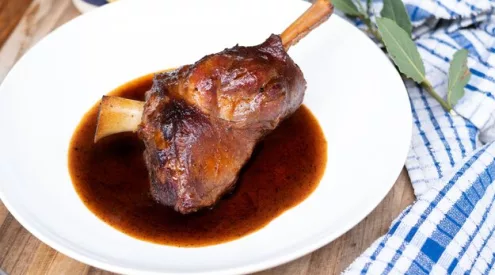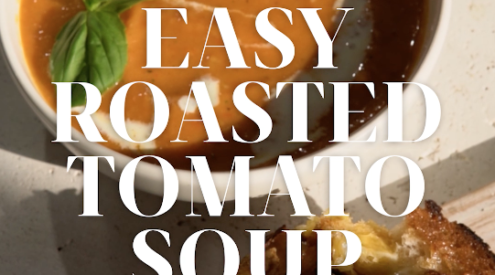This springbok wellington served with parsnip purée, baby root vegetables and a red wine jus can be found on the menu at the Lord Milner in Matjiesfontein. It’s so delicious that we just had to get the recipe from the hotel’s chef, Tronette Dippenaar, and share it with you. It takes a little effort, but if it turns out anything like hers, it will be worth it!

(Curious about Matjiesfontein? Meet the people who call this little town home).
Klein Karoo Springbok Wellington
Serves 6
Preparation: 90 minutes
Cooking time: 11 minutes
Ingredients for the wellington
- 600g deboned springbok loin, cut into 100g portions
- 3 tablespoons olive oil
- Sprig of rosemary
- Large sprig of fresh thyme
- 1 cup dry red wine
- ¼ cup dry white wine
- 2 cups beef stock
- 250g white button mushrooms (include wild mushrooms if you like)
- 50g butter
- 100g spinach, blanched with stalks and veins removed
- 1 x 400g ready-made puff pastry, thawed if frozen
- Flour, for dusting
- 2 free-range egg yolks
- Steamed baby carrots, for serving
- Roast baby beetroot, for serving
- Sea salt and pepper, to taste
Ingredients for the parsnip purée
- 8 medium parsnips, peeled and chopped into thick slices
- 200g unsalted butter
- ½ cup vegetable stock or water
- ½ cup cream
- Sea salt and pepper, to taste
Cooking instructions: springbok wellington
1. Preheat the oven to 220°C. Place the springbok loin portions on a baking tray, brush with 1 tablespoon olive oil and season with pepper and salt. Quickly sear the meat in a very hot pan – it should remain rare. Transfer the meat to a tray, then chill in the fridge for about 20 minutes.
2. Meanwhile, add the rosemary sprig and red wine to the pan and bring to the boil. Add the beef stock and bring to the boil. Cook, swirling the pan occasionally, for five minutes or until the sauce is reduced by half and has thickened to a syrupy consistency. Strain through a fine sieve and discard the rosemary. Set aside until serving.
3. While the springbok is cooling, chop the mushrooms as finely as possible so that they have the texture of coarse breadcrumbs. You can use a food processor, but ensure that you pulse-chop the mushrooms so they don’t become a slurry.
4. Heat the remaining olive oil and the butter in a large pan and fry the mushrooms over a medium heat, with the thyme, for about 10 minutes, stirring often, until you have a soft mixture. Season the mushroom mixture, pour over 100ml dry white wine and cook for 10 minutes, or until all the wine has been absorbed. The mixture should hold its shape when stirred. Remove the mushroom mixture from the pan to cool and discard the thyme.
5. Overlap two pieces of cling film over a large chopping board. Lay the blanched spinach on the cling film, overlapping slightly, in a double row. Spread the mushroom mixture over the spinach, then place the springbok loin on it. Use the cling film’s edges to draw the spinach around the loin, and then roll it into a sausage shape, twisting the ends of the cling film to tighten it as you go. Chill the springbok loin while you roll out the pastry.
6. Dust your work surface with a little flour. Roll out the puff pastry to a thickness of 2mm. Cut the sheet of pastry into six squares of the same size. Unwrap the springbok loin and place a portion in the centre of each block of pastry. Beat the egg yolks with one teaspoon of water and use to brush the pastry’s edges and the top and sides of the springbok. Carefully roll the pastry around the loin with the overlapping sides at the bottom of the roll, pressing well into the sides. Seal the sides with the tines of a fork or spoon handle. Brush all over with more egg yolk and, using the back of a knife, mark the beef Wellington with long diagonal lines taking care not to cut into the pastry. Chill for at least 30 minutes and for up to 24 hours.
7. Brush the Wellington with a little more egg yolk and cook until golden and crisp – 11 minutes for medium-rare. Cut in half and serve immediately with the parsnip purée, carrots, beetroot and red wine jus.
Cooking instructions: parsnip purée
To make the parsnip purée, place the parsnips and butter in a heavy-based saucepan. Place over moderately high heat and sweat to release the flavour but do not colour the parsnips. Add the stock or water and cream and cook until soft. Strain but reserve the liquid. Working in two batches, purée the hot parsnips with some of the reserved liquid until smooth. Keep adding liquid until you achieve the desired consistency. Transfer to a serving dish, stir in salt and pepper and serve immediately.
A bit too high-maintenance for you? Try this delicious recipe for springbok stew with dumplings.


















